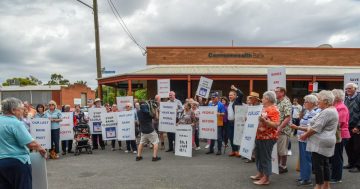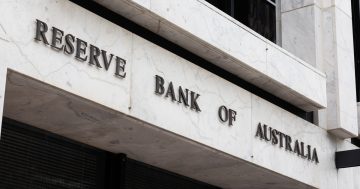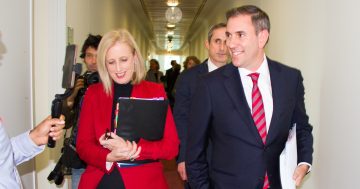David Taylor* says a leading Australian economist is warning of a ‘mini domestic financial crisis’ as bank values plummet.

Image: ronniechua
Yes, it is another economist warning about impending doom.
Before you turn away though, this leading economist insists his arguments are valid.
Independent economic research house Capital Economics is now saying there’s a credible risk of an economic scenario no one wants to see — an Australian financial crisis.
The backdrop to that kind of scenario is already in place.
Take the stock market, for example.
It’s easy to get lost in the day-to-day movements of the stock market.
Stand back a bit though and you can see that the market values of Australia’s major banks have plummeted between 35 and 45 per cent since their highs of 2015.
“This is one of those situations where I can’t keep quiet about it,” said Capital Economics Chief Economist, Paul Dale.
In 2016, the Australian Financial Review judged Mr Dales to be Australia’s economist of the year, saying “he made all the right calls in a market that most chief economists found hard to read”, so his views on the economy are worth noting.
“I think in the worst case scenario you have what you might call a mini domestic financial crisis,” Dales said.
He describes this “mini crisis” as being contained within Australia but capable of producing a “pretty dire scenario”.
“It would be due to a kind of vicious circle developing in the economy where something triggers falling house prices that weaken the economy.”
“That means that some households lose their jobs, they can’t pay their mortgages, which weakens the banking sector, which prompts the banks to tighten lending conditions, which kick-starts the circle again.”
Banking Royal Commission ill-timed, Dales says
A falling property market is key to Mr Dales’s forecast.
He argues the Banking Royal Commission has come at precisely the wrong time, because recent falls in the housing market would morph into much greater falls given tighter lending conditions.
“The most likely trigger on the horizon is the Royal Commission,” he says.
“[It] is designed to weed out [bad practices] in the financial sector in the long run, and put the health of the financial system on a surer footing.”
“But, inadvertently, it could actually prompt banks to withdraw credit at the exact same time the housing market’s really vulnerable, thereby creating that vicious circle of weakening housing market, weakening economy, weakening banking sector.”
Mr Dales claims we’re already seeing signs of this.
“Housing finance commitments are starting to decline … Anecdotally there are reports that some banks are making more stringent checks on their loans.”
But Mr Dales said what has already happened was less important than what could happen next.
“Unfortunately we … don’t really know what kind of credit conditions we’ll see in a year’s time.”
“Perhaps it might be the case that not a lot changes but I think we have to acknowledge the risks that something significant could happen.”
Will a financial crisis hit Australia?
It is important to point out that Capital Economics is not saying a financial crisis is likely.
However, the forecasting firm does argue that the risks of a property market correction, a stock market plunge and a broad economic recession have increased enough to warrant a serious warning to its clients.
Indeed Mr Dales puts the likelihood of an Australian recession in the next five years at 20 per cent.
The ABC put that to another of Australia’s top economists, and received this response: “Well if you back an economist into a corner, and ask them about the probability of recession, the default answer is always ‘probably 20 per cent’,” Commonwealth Bank Chief Economist, Michael Blythe said.
Critics reject Dales’s concerns
Of course the Commonwealth Bank, as Australia’s biggest lender, is right in the thick of this debate.
“The reality is that the pessimists on the Australian economy have been wrong for the past 27 years,” Blythe says.
“Now don’t get me wrong, all good times come to an end eventually, but to trigger this kind of financial crisis scenario, you do need a trigger.”
“The usual triggers here are high interest rates and/or rising unemployment — well, we’ve just heard the Governor of the Reserve Bank again stress that rate rises are a long way off.”
“And as we saw last week … the economy’s motoring along quite nicely now, and certainly at a fast enough rate that unemployment’s more likely to go down than up.”
“You know, some of these views about tighter lending standards and credit crunches look to be overdone I think.”
And there’s another prominent voice defending Australia’s economic prospects.
Concern over highly indebted households reduced spending
The CEO of the Australian Industry Group, Innes Willox says it is the prospect of highly indebted households pulling right back on their spending that’s keeping him up at night.
And any suggestion of a financial crisis doesn’t help that one bit.
“I wouldn’t necessarily want to say that it’s attention-seeking, but it’s certainly headline-grabbing,” Mr Willox said.
“Those sort of calls don’t do anything at all to improve consumer confidence, or consumer sentiment”.
“All it does is probably worry people unnecessarily.”
Mr Dales certainly is not a lone voice, but he said at the very least he hoped his warnings would generate more discussion about the future of Australia’s economy, banking sector, and financial markets.
The Banking Royal Commission resumes in a week.
Mr Dales says it is worth keeping a very close eye on the reaction from the banks.
Much value has already been wiped off the banking sector, but the fear is that another major hit to the banks — from the property market, for example — could lead to much wider consequences for the economy.
No one wants to see that.
* David Taylor is RN Breakfast’s Business Reporter. He tweets at @DaveTaylorNews.
This article first appeared at www.abc.net.au.











